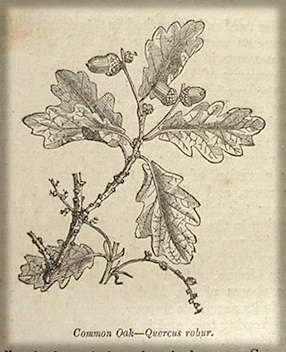
Properties of Timber - Oak
In point of strength, durability and general application, Oak claims the precedence of all timber; and to England, which has risen to the highest rank among the nations, mainly through her commerce and her marine, the oak, "the father of ship", as it has been called, is inferior in value only to her religion, her liberty, and the spirit and industry of her people.
Of the oak, called Quercus in Latin, there are fourteen species described by Linnaeus. Professor Martin lists twenty-six; Willdenow, who wrote in 1805, describes seventy-six, and Persoon, another naturalist of the same date, enumerates eighty-two. More than half of them belong to America.
Of the various species of oak, some may be classed with shrubs, others with the most majestic trees of the forest. Some are evergreens; some lose their leaves during the winter.
The species from which the best timber is derived, which is by far the most abundant in Britain, is the COMMON OAK (Quercus Robur).
The woodcut shown exhibits the leaf, flower and fruit of this tree.

Oak from America is much inferior to that from England. The oak from central Europe is also inferior, especially in compactness and resistance of cleavage. The knotty oak of England, the "unwedgeable and gnarled oak", as Shakespeare called it, when cut down at a proper age (fifty to seventy years) is really the best timber that is known. Some timber is harder, some more difficult to rend, and some less capable of being broken across; but none contains all the three qualities in so great and so equal proportions. For supporting a weight, resisting a strain and not splintering by a cannon shot, the timber of the oak is superior to every other.
Excepting the sap wood, the part nearest the bark, which is not properly matured, it is very durable, whether in air, earth or water, and it is said that no insects in the island will eat into the heart of oak, as they do, sooner or later, into most of the domestic and many of the foreign kinds of timber.
summarised from "The Library of Entertaining Knowledge - Timber trees" (1829), pub. Charles Knight, Pall Mall.
ND, habitat21
big turbines
small turbines